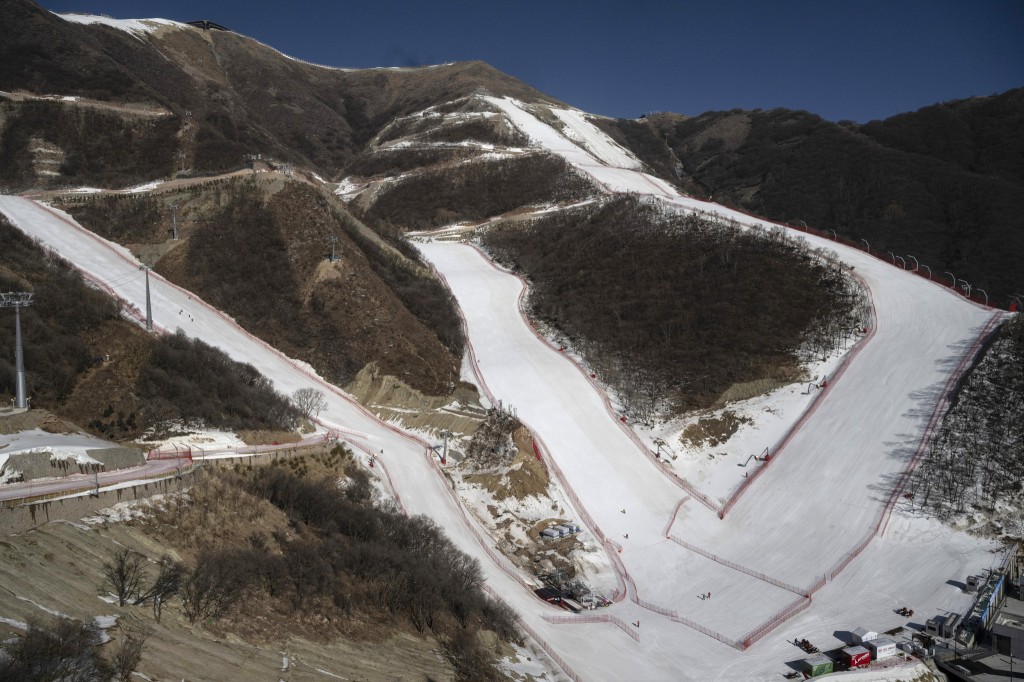
By Anders Lorenzen
Anyone who has been paying slightly closer attention to the broadcasts of the Beijing Winter Olympics would have noticed a distinct lack of snow. Only the competing areas are covered by snow, produced by snow canons.
There are two things at play here. First, as we recently reported due to the accelerating pace of climate change the viability of the Winter Olympics is becoming severely unstable. This is due to unreliable snowfall, and also that the so-called snow guarantee locations are diminishing over the years.
Second, the area where the 2022 Beijing Winter Olympics are held, even though it is cold enough to provide snow conditions, is also one of the driest areas of China without dependable regular precipitation. Both cold temperatures and precipitation are necessary to create snowy conditions.
There are quite different arguments one could make as to why sporting bodies like the International Olympic Committee (IOC), FIFA and so on award sporting events to countries and areas where the climate is not suitable but because the money offered is high. The Football World Cup in Qatar this year anyone?
I wonder how athletes feel skiing or snowboarding down a slope flanked by a grey industrial landscape to either side and no hint of snow apart from underneath their skis or snowboard?
A warning about the climate crisis
If anything, Beijing 2022 should serve as a warning of how winter sports are under threat from climate change. Yes, the Chinese hosts have got away with it by making artificial snow. But you can only do that if the conditions are right, it still has to be freezing and it is no good if you are in a situation when it is 10 degrees C for instance. There is a heavy energy and water footprint from creating artificial snow which in turn creates more emissions that exacerbate climate change.
Globally, winter sports resorts are put on notice as the whole industry is at severe risk in a warming world. It, therefore, makes sense for them to lead the charge in tackling the climate crisis. Yes, for sure you can do some adaptive work with snow canons to create artificial snow, but this can only be partially successful and, perversely, the technology contributes to making climate change worse.
And as glaciers are receding and the mountains store less snow during winter, communities that depend on that meltwater will have to find their freshwater sources elsewhere and will be less pleased if water is going to be used to satisfy snow tourists.
As I explained earlier creating artificial snow can only do so much. In recent years you have seen resorts receiving large mounds of snow in preparation for the season, and then during the season are plagued by warm temperatures and rain not suited for winter sports.
The only hope in such scenarios is hoping that it freezes overnight and creates fresh snow. Even if that succeeds as the thaw returns the next day rather than skiing on the frosty fresh powder you will ski on melting snow, which is not the kind of surface that skiers and snowboarders enjoy, creating unpredictable conditions and causing injuries.
Winter wonderland no more
And I don’t know about you put part of the lure of hitting the slopes is being in a winter landscape. The frost tingling in your nose, the snow-covered trees and mountains in the distance and even skiing while it is snowing is a huge part of the excitement. I remember last time I was skiing, I found myself taking a moment before rushing down the slopes to admire the views, snow-capped mountains as far as I could see. Or in the morning waking up in bed and seeing the snow there was the excitement and anticipation of getting up and hitting the slopes. One of the things that concern me greatly about the climate crisis is the fear of losing regular and predictable snow, and snow-covered landscapes will become more of a rarity.
But back to the Beijing Winter Olympics. I have had troubling thoughts as to why on earth the IOC could ever think it was a good idea to hand the 2022 Winter Olympics to Beijing. They knew fully well that snow cover is very unlikely in the region designated, and then at the same time proudly they declared this is going to be the greenest ever Winter Olympics.
If Beijing 2022 is the greenest Winter Olympics with the huge carbon and water footprint from running snow canons constantly 24 hours a day, then someone must have been counting the wrong data.
Categories: China, climate change, impacts, opinion, Sports